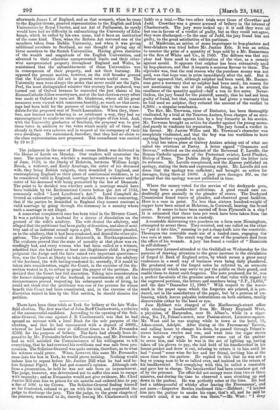There have been three trials at York for bribery at
the late Wake- field election. The first was that of John Barff Charlesworth, a relative of the unsuccessful candidate. According to the opening of the Soli- citor-General, the case against J. B. Charlesworth was that he had opened an account with a local Bank for the sole purpose of the election and that he had cemmenced with a deposit of 5000/., whereof‘ he had handed over at different times to a Mr. Fernandes 37601. for the purpose of bribery. The facts had already been de- posed to by Mr. Fernandes before the Commission, and Mr. Fernandes had so well satisfied the Commissioners of his willingness to tell everything, that he had received his certificate and was safe from pro- secution. 'The Solicitor-General was quite certain, therefore, as to what his witness could prove. When, however, this same Mr. Fernandes came into the box at York, he would prove nothing. Nothing would induce him to repeat before Mr. Justice Hill what he had said be- fore Serjeant Pigott. He had got counsel's opinion. Although safe from a prosecution, he held he was not safe from an impeachment. The judge, however, was determined not to suffer this man to escape with impunity ; and Fernandes would.not give evidence, Mr. Chief Justice Hill sent him to prison for six months and ordered him to pay a fine .of 5001. to the Crown. The Solicitor-General finding himself so far frustrated refused to an on with the trial, and requested the
liable to a trial.—The two other trials were those of Crowther and Judd. Crowther was a grocer accused of bribery in the interest of Charlesworth. The jury were locked up ; it is said they were all but one in favour of a verdict of guilty, but as they could not agree, they were discharged.—In the case of Judd, the jury found him not guilty, to the great satisfaction of his partisans. At Maidstone, an action of some importance to hop-planters and beer-drinkers was tried before Mr. Justice Erle. It was an action to recover the price of a quantity of hops sold by a Mr. Bannerman to the firm of White and Co., in 1860. The defence was that sul- phur had been used in the cultivation of the vine, as a remedy against mould. It appears that sulphur has been extensively used by hop-planters, and that it imparts a noxious flavour to them. The rejoinder was, that the real reason why the purchase money was not paid, was that hops rose in price immediately after the sale. But it further appeared that, although sulphur had been used, Mr. Banner- man gave a warranty that no sulphur had been used; his reason for not mentioning the use of the sulphur being, as he averred, the smallness of the quantity applied—half a ton to five acres. Never- theless, the jury found for the plaintiff, namely, that he had not been guilty of fraud, but that, inasmuch as he had given a warranty that he had used no sulphur, they reduced the amount of the verdict to 6,3001.: a singular conclusion.
The Rev. bfr. Trewman, vicar of Ilminster, has been thoroughly vindicated, by a trial at the Taunton Assizes, from charges of an atro- cious character made against him by a boy formerly in his service. Mr. Trewman brought an action for slander against the young scoun- drel purely to vindicate his reputation. The jury found a verdict in his favour. Mr. Justice Wines said Mr. Trewman's character was completely vindicated, and that the boy was too worthless to have anything further expended on him.
A trial has taken place at Galway Assizes arising out of what are called the evictions at Partry. A letter signed "Oranmore and Browne," reflected on the conduct of the Reverend P. Lavelle, the- Roman Catholic opponent of the Protestant evictor, Lord Plunket, Bishop of Tuam. The Dublin Daily Express copied the letter into its columns. Mr. Lavelle complained, and the Express published am apology, stating the facts and expressing regret. Mr. Lavelle did not deem that the apology was sufficient; and brought an action for damages, fixing them at 1000/. A jury gave damages 20/.. on the ground that the apology was not published in time.






























 Previous page
Previous page